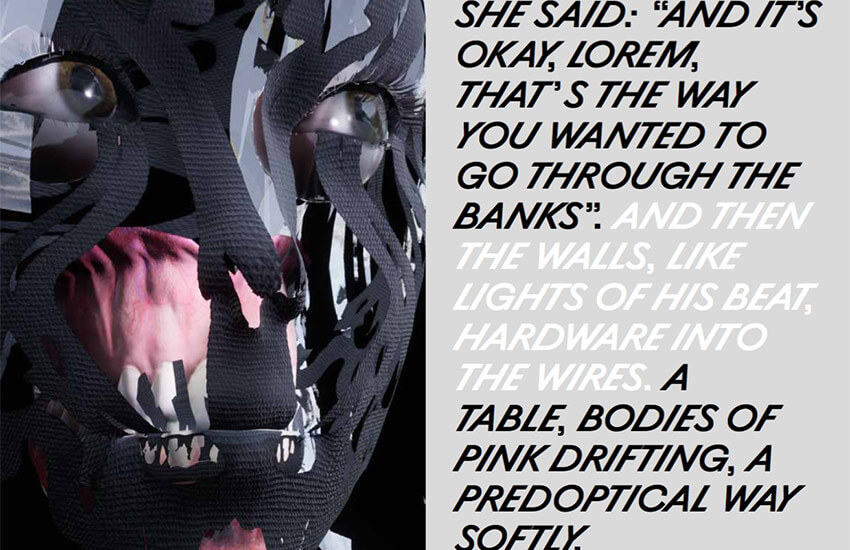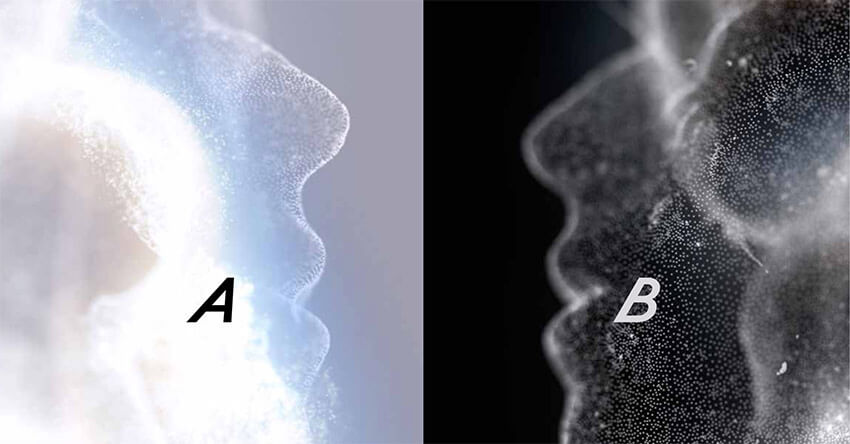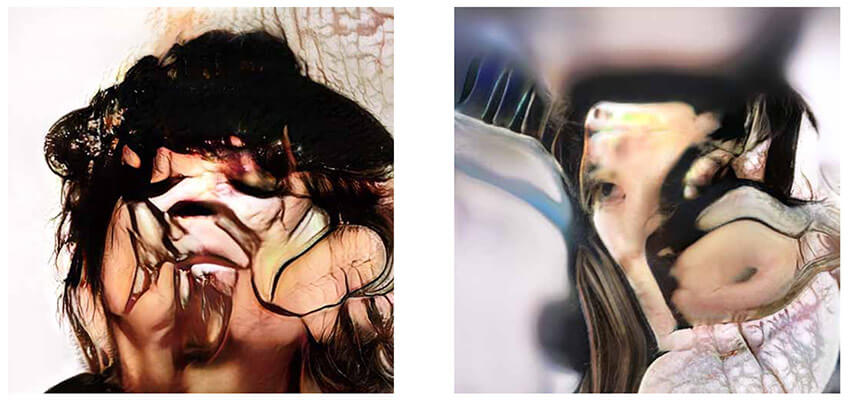Interview by Allan Gardner

Lorem, conceived by Italian musician and Publisher Francesco D’Abraccio, is a multidisciplinary project involving AI and video artists, musicians and instrument designers, and computer specialists. The project is an inquiry into human-computer interaction in the age of Artificial Intelligence.
Best Known as one half of Aucan, D’Abraccio began the Lorem project by building a collaborative platform including AI artists (Mario Klingemann, Damien Henry), video artists (Karol Sudolski, Mirek Hardiker), information engineer researchers (Nicola Cattabiani) and musical instrument designers (Luca Pto) produced using original materials including audio, visuals and lyrics.
This collaboration extends outwith the human component, focusing on how the contributors interact with the programs, technologies, software and Artificial Intelligence utilised within the project. The aim of Lorem is not simply to produce audiovisual work using contemporary technologies and ideas. Instead, it seems to focus more directly on the act of working alongside technologies.
It’s a project deeply considering the term “Artificial Intelligence”, particularly the Artificial prefix. The idea that because something is artificial means that it is incapable of creativity or creative collaboration is rejected, blurring the lines between human intervention and technological production.
Lorem’Adversarial Feelings release links will be released on 19th April on SD card, including 8 video works produced to run concurrently with the tracks. The video works are AI-generated, responding to the sound works. It’s available now via A’Braccio’s own Krisis Publishing. Deep neural networks, hacked hardware, and programming errors are used to drive machines toward autonomous aesthetic behaviours.
The prevalent idea is that although the genesis comes from a human source, the AI will eventually be able to produce a unique aesthetic audiovisual experience that was not conceived by humans – instead, the human element is responsible for the conception of an environment in which this was possible. The aim of Lorem, it seems, is to explore possibilities for the perception of human emotion in Artificial Intelligence through the use of what D’Abraccio describes as “Emotional data sets” in the form of music, visuals and texts.
These creative outcomes are regarded as indicative of typically human expression. By sharing them with AI, non-human reactions to these expressions are generated. Ultimately, this points towards a better understanding of the human experience in the digital age.


You are a musician and an artist, and Lorem is your music-driven multidisciplinary project. For those that are not familiar with your work, what are your background and interests?
I am a musician coming from life experience with the band Aucan. We have been touring for almost 10 years, and I have always been interested in melting the borders between experimental music and club culture, electronics and live acts. Besides music, I studied philosophy and design&arts, and I cofounded Krisis Publishing, a curatorial and independent platform focusing on visual arts, media, technology and their impact on societies.
With Lorem, I tried to involve all those influences in my process. I tried to represent the fast, complex, sometimes schizophrenic feelings I experience as an individual living in a data-driven society through the lens of non-human perspectives.
Lorem, your music project is an inquiry about human-computer interaction in the age of Artificial Intelligence. What is the main aim behind this project, and what was the intellectual process behind Adversarial Feelings?
Adversarial Feelings is an attempt to inform non-human intelligence with emotional data sets in the form of texts, music and sounds. The goal is to observe the affective dimension of intimacy from the outside, to speak about human emotions as perceived by those non-human eyes. Even if Neural Networks are involved in many processes, it is an album about being humans in the age of data.
And what have been the biggest challenges for the development of this work?
I had many technical challenges. I am not a skilled programmer or a data scientist. The problem with AI is that you have to go deep into the problems to get a broad perspective on things. On the other side, many technical questions are really abstract, and they demand new narrative solutions to translate conceptual considerations. I had been lucky since the AI community is very collaborative, and I had the opportunity to count on great professionals and artists.
In your practice, you use AI to produce music and images. Do you see it more as a tool or a creator?
Definitely not as an artificial subject. I think AI is far away from being human. I would say it’s more like a device to interact with. But It’s an evolving device, able to learn and to act responsively to the input it receives. That’s why I decided to represent it as alien intelligence in the book.
And why do you think is relevant to produce art with AI? What are the main relevant conversations, in your opinion, it sparks?
I think artists and communities should be active agents in the debate about how to employ artificial intelligence in our society. When we think of AI, we use to think about a completely independent sentient being with his own identity. But algorithms are not something natural, as they respond to precise human purposes. They represent a political issue. Once emphasised those agencies, we can propose new creative, fair approaches to the discipline.
What directions do you see taking your work into?
I think Lorem is at a very early stage. I plan to deepen my research and keep releasing stuff and playing live AV shows in the next months. I want to keep working both on installations for artistic contexts and on live sets for a more “club” circuit.
What is your chief enemy of creativity?
Mmm.. push notifications?
You couldn’t live without…
Pretty sad to say… the Internet.






